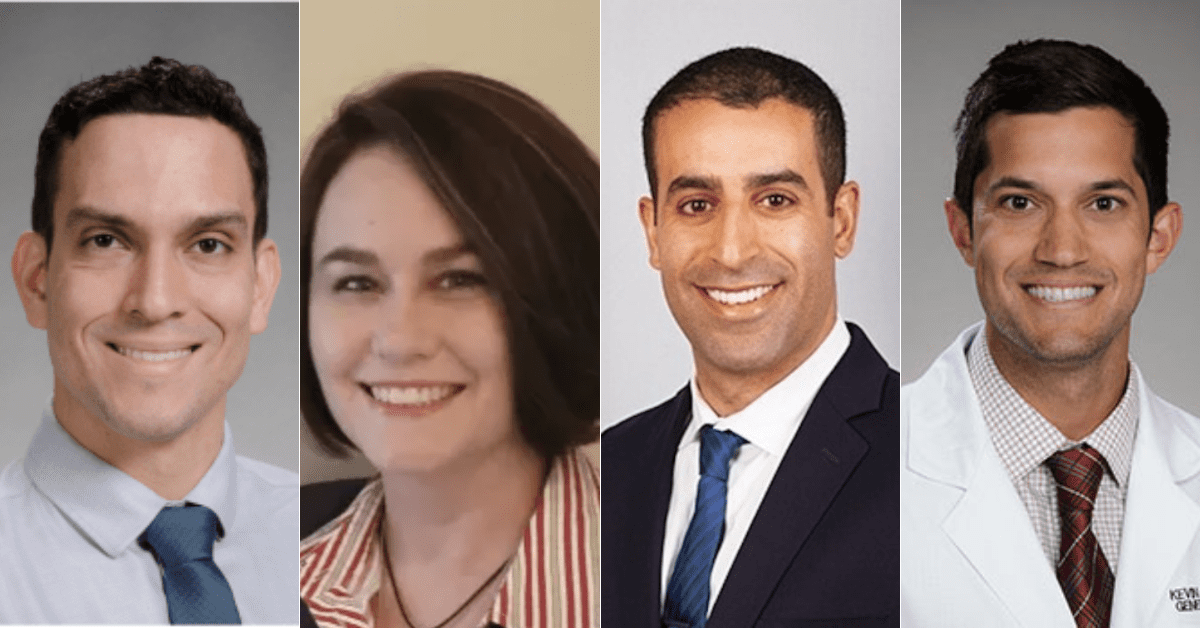The chief residents and fellows at UW Medicine are key players in the clinical space through their guidance and leadership, but who are they?
About the chief residents and fellows
The chief residents and fellows are trainees, usually senior, who serve as the leaders and representatives for the group of residents or fellows in their training program. Their roles and responsibilities can vary greatly depending on their program, but each chief resident and fellow is expected to be a model of professionalism, to communicate or liaise with a variety of stakeholders to represent their trainees’ needs or opinions, and to provide counsel to trainees about all matters — big or small
These roles are essential at UW Medicine because these individuals represent the interests and opinions of a critical group of the workforce while also acting as subject matter experts. They answer questions that would otherwise go to faculty or administrative staff and bring knowledge and insight that might otherwise get lost when developing policies, practices and communications. Many chiefs eventually pursue faculty roles and become clinician educators within the system.
Serving as chief is also an opportunity for a trainee to expand their leadership skills and get insight into the complexities of how a training program is operated. The selection process varies depending on the program. Some programs hold faculty or peer elections, while others have faculty members select trainees based on written criteria. All chiefs are chosen for their leadership abilities, clinical or scholarly accomplishments, administrative or oversight abilities, and strong communication and interpersonal skills.
To be a chief resident or fellow is a prestigious honor — one that can involve an additional year of training beyond the board eligibility and requires a large amount of attention. It denotes a respected leader.
Get to know some of the chief residents and fellows below.
Brian Cervoni Rosario, MD, Physical Medicine and Rehabilitation, Chief Resident
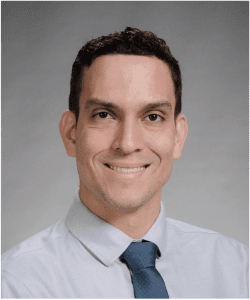
Why did you decide to become a chief resident?
I decided to become a chief resident for the opportunity and desire to serve and advocate for my classmates. I have always enjoyed serving in leadership positions, and this would be an excellent opportunity to learn more about academic medicine.
Why did you choose UW Medicine?
UW Medicine’s Physical Medicine and Rehabilitation residency program provided me with an excellent and broad training experience. I have been fortunate to learn from various leaders in my field.
How has this experience helped you grow as a leader?
My residency program has three chief residents, including myself. As such, I have learned a lot about how to function effectively in a shared-leadership role where we may have differing views and approaches to addressing certain situations.
What has been the most rewarding part about being a chief resident?
Being in a position to help others, knowing I was — or am — in my colleagues’ shoes.
What would you say to other physicians hoping to follow the same path?
Don’t ever forget to first listen and understand others.
What is your current favorite de-stress activity?
Cycling and exercising at the gym.
Maureen Murphy-Ryan, MD, Psychiatry, Chief Resident
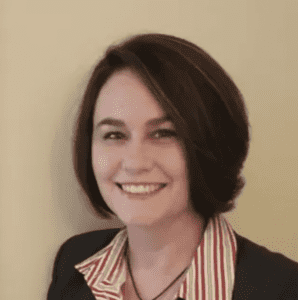
Why did you decide to become a chief resident?
The University of Washington’s Psychiatry Residency Program trains one of the largest resident cohorts in the U.S., and our chief residents serve important roles and work closely with the administration. So there was definitely a sense of duty there in appreciation for all my program has given me. Prior to becoming chief resident for recruitment, teaching medical students and interviewing applicants gave me energy and gratitude, and I sought out those opportunities. When my program director invited me to consider serving as recruitment chief, the position made sense based on my interest in academic psychiatry and general gregariousness. I was able to sit down with my program director before committing to the role to make sure I would have a rotation schedule that would allow me to pursue my other goals, which has made this year very enjoyable and not overwhelming. The personal interactions with eager applicants make the administrative tasks worth it.
Why did you choose UW Medicine?
I met a UW psychiatry residency graduate at a national medical conference who strongly encouraged me to apply to UW Medicine as an institution that has had repeated success supporting residents under contract with the Washington Physician Health Program. The program supports medical professionals with medical conditions that may affect patient care in safely returning to work. This was very important to me as someone in long-term recovery from alcohol addiction needing such support. Working as a UW Medicine resident, I have gotten to know other medical students, residents and attendings in recovery from mental health conditions, including substance use disorders, who appreciate the supportive work environment UW Medicine provides for individuals in recovery. The quality of the addiction psychiatry and addiction medicine training at UW School of Medicine was another huge draw. I plan to specialize in addiction psychiatry and hope to stay here for my training.
How has this experience helped you grow as a leader?
Being on the admissions committee is fascinating and challenging. It gives me a lot of perspective on how lucky I am to be here. The applicants seem so much more impressive than when I first applied to residency 10 years ago, and have been through so many challenges with COVID-19. It’s hard hearing of the projects that had to be halted or dismantled and the clinical opportunities lost. Most of my prior leadership experience has been from being in charge of some small project or team. I am now learning how to participate in hard decisions as an equal member of a team that values diverse viewpoints and works diligently to address bias. It’s a wonderful learning experience.
What has been the most rewarding part about being a chief resident?
Helping applicants with greater barriers to admission, particularly our international medical graduates, has been the most fulfilling so far. I am realizing that as a future leader in medicine, I am most interested in working directly with fellow health professionals who are struggling in some way.
What would you say to other physicians hoping to follow the same path?
If being a chief resident fits your career goals and values (and your total responsibilities will still allow you to maintain wellness), go for it. I am so honored to have been seen for my abilities rather than my past — to be considered for this role as someone who was not sure if she would ever practice medicine again six years ago is amazing. It has been a great experience thus far.
Omeed Alipour, MD, Gastroenterology, Chief Fellow
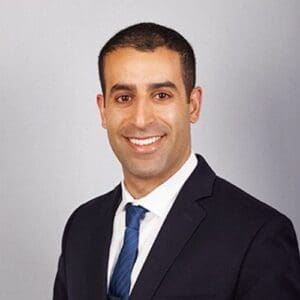
Why did you decide to become a chief fellow?
Our fellowship chief position is a little different than some chief resident positions, which require an extra year. We have two chiefs that are third-year gastroenterology, or GI, fellows. Taking one of the two chief fellow positions in our GI fellowship was a natural decision for me based on UW Medicine Graduate Medical Education committee involvement and other experiences I have had with GI societies as a trainee, rather than something I had planned on pursuing. Being involved with a UW Medicine GME committee before my chief role exposed me to a lot of the behind-the-scenes work that goes into running a residency or fellowship. I think it highlighted the importance for residents and fellows to have some voice in all levels of program, division and departmental leadership and decision-making. chief fellows and residents are that easy channel for residents and fellows to voice concerns and are a representative to bring any issues to the program or GME leadership.
Why did you choose UW Medicine?
I chose UW for a combination of personal and academic reasons. Seattle as a city, and the Pacific Northwest, has a ton to offer and as a native Californian, I was drawn to the location. Academically and career-wise, I was impressed with the UW Medicine community during my interviews. Additionally, I felt that UW Medicine had a lot to offer in terms of research and leadership opportunities.
How has this experience helped you grow as a leader?
The chief role places you in a position where you clinically are a peer, but you are also creating call schedules for the same peer cohort and addressing any issues that come up for those co-residents or co-fellows. It teaches flexibility, problem-solving and organizational skills.
What has been the most rewarding part about being a chief fellow?
UW Medicine and the Gastroenterology Division specifically have given me a lot in terms of training and career development. Being able to give back, in even a small way, to my program and to represent my co-fellows has been rewarding.
What would you say to other physicians hoping to follow the same path?
Clinical duties and related studies come first. After that, find what motivates you and only engage in activities that you are passionate about. If the interest isn’t there, additional work or commitments will be tedious and only leave you more drained. If you are interested in being involved in leadership, QI, or advocacy, don’t be afraid to reach out to your program director. Even a cold email to residents and fellows involved in committees and task groups you are interested in, or to the GME office expressing your interest to get involved, can be a great place to start.
What is your current favorite de-stress activity?
If time, weather and finances allowed, I would go snowboarding every week. Access to mountains was one of the draws for UW Medicine and living in Seattle for me. Unfortunately, it is an expensive and inconvenient hobby to have. So instead, it is usually other exercise, particularly running outdoors, that lets me clear my mind and allows for a mental refresh.
Kevin Labadie, MD, General Surgery, Chief Resident
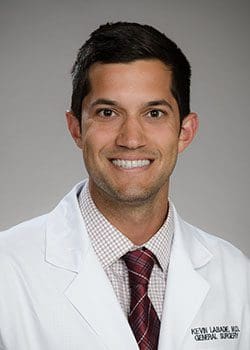
Why did you decide to become a chief resident?
Every general surgery resident assumes a chief resident role in their final year of training, so it was a decision that was made for me. It has been a great experience to be a part of the Department of Surgery leadership and something I have greatly appreciated.
Why did you choose UW Medicine?
UW Medicine and the UW Department of Surgery is a top place for surgical trainees. It fosters a rich learning environment with a unique combination of clinical training sites. UW Medicine also attracts highly talented faculty and residents, who I have been fortunate to train with and learn from. I am from the West Coast, so it’s great to be close to home, the mountains and water. Seattle is a beautiful place.
How has this experience helped you grow as a leader?
I have realized that there are times to lead from the front and times to lead from behind. A great leader knows when either strategy is needed and how to implement it effectively.
What has been the most rewarding part about being a chief resident?
Seeing my co-residents grow over this past year!
What would you say to other physicians hoping to follow the same path?
The path is challenging but worth it. No matter how difficult it may get, always try your best to find joy in your work.
What is your current favorite de-stress activity?
I love the outdoors and spend my free time skiing and mountain biking. But after a long day in the operating room, you’ll often find me on the couch watching Seinfeld re-runs.
